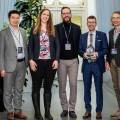Spotlight talk for Warsaw4PhD Doctoral School at IChF PAN
Date: 27.09.2022
Warsaw Doctoral School in Natural and Biomedical Sciences and the Institute of Physical Chemistry PAS cordially invites you to a SPOTLIGHT TALK
Understanding biological roles of glycans via chemical sensing and gas-phase analysis
given by Dr Mateusz Mariański, Hunter College, The City University of New York
on 6th October 2022, 10:00 at IChF Aula
Duration: 2x45 min
The event is thought as an in-person seminar, but stream will be provided for those who cannot attend it. Zoom connection details are as follows:
Link: https://zoom.us/j/94864243306?pwd=TUhUSFlsQUdQRFF3OFN1Z1ppQlljdz09
Meeting ID: 948 6424 3306
Password: 347293
This event is supported by the Polish National Agency for Academic Exchange, grant no. BPI/STE/2021/1/00034/U/00001.
Highly recommended to all Warsaw-4-Phd students!
Talk abstract:
Interactions that occur on the cell surface have a central role in regulating many important biological processes, including, immune response, cell-cell communication, disease progression, and cell‒pathogen interactions. These processes are mediated by cell-surface glycoproteins, glycolipids, and glycopolymers, and glycans expressed in the glycocalyx are unique identifiers of cell type that can indicate disease and could serve as drug targets. For many diseases and infections, there is still a need for effective treatments that halt their progression, and molecules that can bind the glycans could be used for early detection of the disease biomarkers or as drug delivery agents, as anticancer and antiviral treatments. These needs, however, require understanding of the chemical underpinning of the protein-glycan recognition, as well as efficient and detailed methods of structural analysis of glycans.In the first part of the lecture, I will summarize role of glycans in diseases and viral infections, and discuss the challenge associated with the design of therapeutics targeting surface glycans. Next, I will discuss the basics of chemical recognition of glycans using covalent binding, metal-assisted binding, and noncovalent interactions. Finally, I will introduce the idea of flexible synthetic carbohydrate receptors, which include cooperativity and multivalency in their binding mode, as a design that could lead to development of novel sensing devices and unlock new glycan targets for future therapeutics.In the second part of the lecture, I will discuss recent advances in gas-phase glycoanalytics. In principle, the development of the glycomics has been hampered by the lack of both high-resolution and high-throuhtput methods to able to isolate and deduce a glycan structure. Herein, I will focus in recent developments in liquid chromatography, mass spectrometry, ion-mobility spectrometry and cryo IR spectroscopy in the context of the glycan analysis, discussing the strengths and limitations of these methods. While each of these methods has its own merits, the combination of the techniques provides a multidimensional reference library that could be used for seamless identification of complex glycans. Finally, I touch on the role of the computational chemistry in glycoanalysis, and its synergy with the gas-phase glycoanalysis




